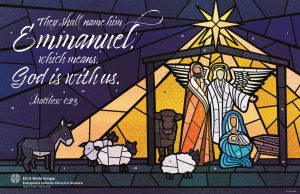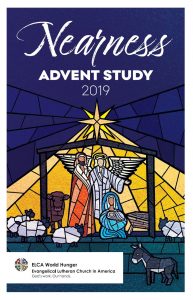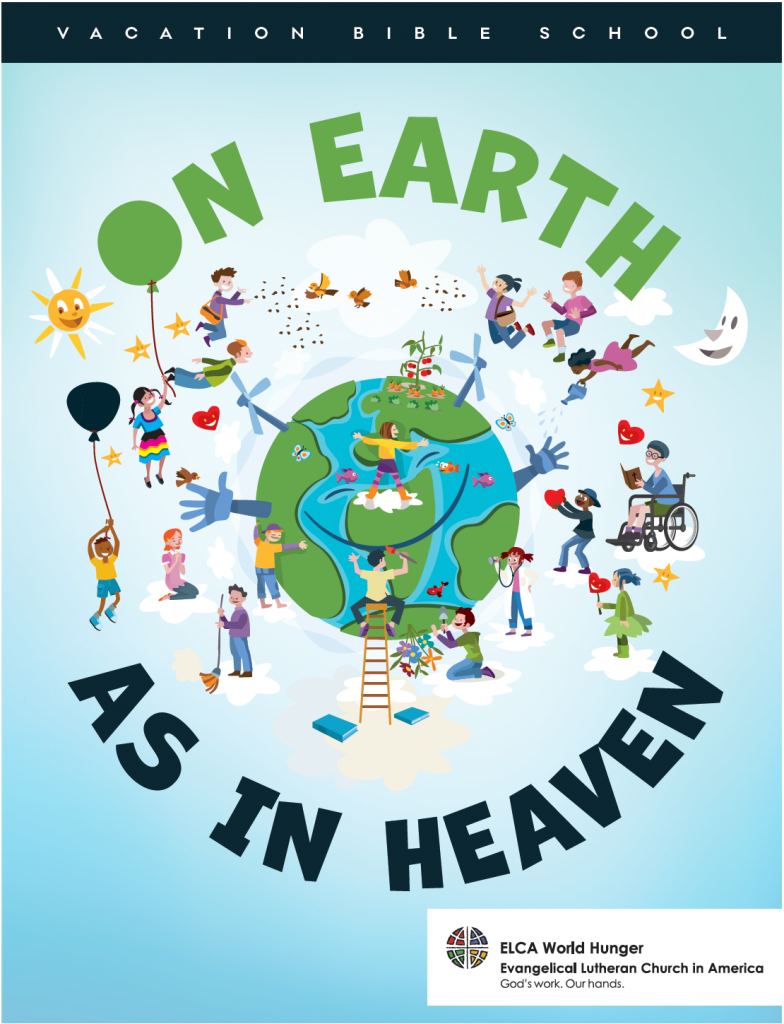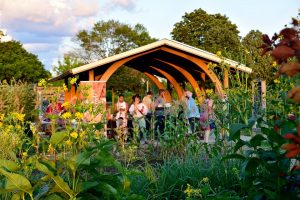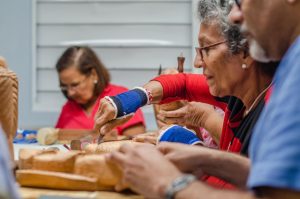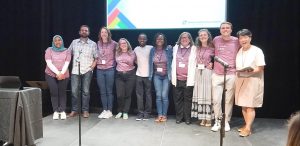This advent reflection is part of ELCA World Hunger’s 2019 Advent Study. You can download the full study here. The children’s messages are a part of ELCA World Hunger’s Sermon Starter series which is published via email every Monday. You can sign up for the weekly email here on the right side of the page.
Week 4
God is with Us
“‘Look, the virgin shall conceive and bear a son, and they shall name him Emmanuel,’ which means, ‘God is with us’” (Matthew 1:23).
You are loved.
No, really.
That’s it.
That is the message of Advent, Christmas — the entirety of the gospel story, in fact.
You are loved.
In the baby — whose name shall be Emmanuel, which means “God is with us” — God has drawn near to humanity in familiarity, intimacy and even identity. God has become human, entering into our world and our very existence. And the message God has brought? You are loved.
Two thousand years of Christian history, and yet that basic message has not changed. God has drawn near, and the message brought to all creation is “you are loved.” Scripture is filled with stories of God speaking to God’s people. Sometimes God speaks to them directly. Moses approaches a burning bush and hears God “informing him, ‘I will send you to Pharaoh to bring my people, the Israelites, out of Egypt'” (Exodus 3). In the middle of the night, Samuel hears God calling his name (1 Samuel 3). At other times, God speaks through the prophets to the people.
But here …
in this manger …
in this moment …
on this night …
There is no mountain-splitting, quaking prelude like Elijah heard outside his cave (1 Kings 19). There is no opening in the heavens, no descending Spirit, no voice from the clouds (Luke 3.) The baby in the manger is God’s whispered good news: “You are loved.” In the first session of this study, we read a sampling of modern-day billboards warning us of God’s coming wrath. The writings of our biblical ancestors reflect a similar level of trepidation about the day God would draw near. What judgment might befall them when God arrived? What word might God speak?
In the manger in Bethlehem, God did show up. And the word was “love.”
As gospel people, the church proclaims this message: “You are loved.” Obviously, such a simple message doesn’t give us the directives that are to be taken in the many complex situations in which the church finds itself in daily life. Such a simple message does not give us all that we need to make the many minute decisions that organizations and individuals must make. But it does give us a clear message and identity.
Who is the church? The beloved of God.
Who is my neighbor? The beloved of God.
Who is this stranger in my midst? The beloved of God.
To be the church, to be people of the gospel, called to spread the good news, is to ensure that every person we encounter leaves knowing they are loved. To be “evangelical” is to be sharers of the good news – and that good news is that we are loved by the very creator of the universe.
This almost seems too simple, and in some ways, it might be. But how often does the message the world sends us undermine our confidence in this message? How often are we told that we must make ourselves lovable enough, work hard enough, look good enough, decide wisely enough, or behave appropriately enough to merit the concern or consideration of others around us? The church has a different message: You are loved because the One who created you has marked you as loved. Christ-centered ministries have this message of Christ at their heart.
Rain or shine, the East Boston Community Soup Kitchen opens each Tuesday without fail, serving up nutritious fare — with an extra helping of love — from the basement of Our Saviour’s Lutheran Church. Volunteers offer weekly breakfast, lunch and dinner to more than a hundred guests, many of whom face the challenges of poverty and addiction. Guests can also pick up hygiene kits or a set of clean clothes and access social services.
“This space is where we all come together and treat each other with love, with that respect and dignity that we all like to receive,” says Sandra Aleman-Nijjar, the kitchen’s lead volunteer. “We give that to everyone that walks through those doors.” Eddie, one of the guests at East Boston, knows this to be the case. Having lived on the streets since he was 18, Eddie calls the ministry “my home,” a place of belonging and acceptance where his needs — physical, spiritual and emotional — are met. “He feels loved, that someone cares,” says Sandra. “You can see it in [each of] them, that sense of belonging, that sense of acceptance. That someone cares about them, that someone is watching and looking out for their well-being.”
To be “evangelical” is not merely to share the basic facts about faith but to live out a faith that assures us — and our neighbors — that we are loved. For guests at the East Boston Community Soup Kitchen, that means that every plate of food served is a form of evangelism, a way of sharing the good news that is the very message of “Emmanuel”: you are loved.
God’s love calls us to active love and service of one another. Authentic love — the love God shows through Christ — sets tables where all are welcome, calls religious and political leaders to repentance for their treatment of neighbors facing poverty or vulnerability, and testifies to new life in the face of death-dealing powers. It is not merely a word spoken but a life lived, walking with and standing by our neighbors.
This is the Promised One we have been waiting for, and this is the message we have been longing to hear. Through Mary and Joseph’s journey to Bethlehem, through John the Baptist’s hours of ministry at the Jordan, through our expectant longing in Advent — this is the message we have been waiting for. And the message many of our neighbors continue to pine for.
You are loved.
Now, love one another.
Reflection Questions
- When during this season have you felt loved?
- How does your congregation share the message “you are loved” with neighbors in your community?
- Watch ELCA World Hunger’s video “East Boston Community Soup Kitchen” at https://vimeo.com/293599869. How does the ministry in East Boston help guests feel “that sense of belonging, that sense of acceptance”?
Children’s Message
Pastor Tim Brown is the writer of this Advent children’s message. Pr. Tim is a Gifts Officer and Mission Ambassador for the Lutheran School of Theology at Chicago and a pastor and writer out of Raleigh, NC. This Advent Children’s Message is cross-posted from ELCA World Hunger Sermon Starters.
Set-up:
The season’s texts provide the leader with an opportunity to practice Advent anticipation, and each children’s message with grow week to week until Christmas Eve/Christmas Day.
This is the last week, and there should be a small box with a pocket mirror inside. A large yellow star should be on the outside of this small box, with the poem below printed on it.
Script:
Invite the youth to come forward.
“Look here, folks, I have that final box here, and I can tell there are things inside of this one, too. How can I tell? Just listen!” Shake the box “Now, remember what was inside of last week’s box? Right! Band-Aids. And what did we do with those Band-Aids? Right, we gave them away as reminders that God invites us to heal the world. Some of those people out there even put them on. What do you think is in this box?” Field answers as time allows “Could be any of those things! But look, on here is also a yellow star. Ah, look, here’s a poem on the yellow star. Can someone read it?” If the youth are too young or too shy to read, go ahead and read it aloud:
“The baby is coming soon
And we’re dreaming of the child
And the night will arrive
So meek and so mild
But until then God’s dream
Is for someone else to be a life-changer
We don’t need to wait for the babe in the manger!
And just who should it be?
Open me up to see…
Should we open it and see what’s inside?” Open the box dramatically. If it has a lid, unveil it with panache. If it is sealed in wrapping paper, invite the youth to help you tear it open. Show the box with the mirror inside.
“Wow, a mirror. ‘But until then God’s dream/is for someone else to be a life-changer/we don’t need to wait for the babe in the manger/and just who should it be? Open me up to see…’ Who do you all see? Hold up the mirror.
“Yes! It’s you. You are the one God is dreaming of who will start the change the world. And we can change the world by giving our gifts to help those who don’t have much, by being a good friend at school to kids who are picked on, by making meals and sharing it with our neighbors. Who else can think of a way we can start to change the world?” Field answers as time allows.
“But, there’s one more thing, come close! Make sure your mic is off “Those people out there? They need to start changing the world, too. So, I want you to go ask them a question, an important question this Christmas. Ask them how they will change the world this Christmas. Say, “How will you change the world this Christmas?”
Go ask them. And if anyone gives you an answer, come back and tell me. You can tell me now or after church. Ready? Go!”

